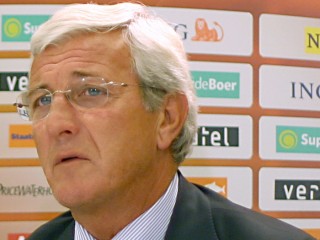
Lippi Marcello biography
Date of birth : 1948-04-12
Date of death : -
Birthplace : Viareggio, Italy
Nationality : Italian
Category : Sports
Last modified : 2010-05-06
Credited as : Football coach Italy, World Cup, UEFA
0 votes so far
As manager he won five Serie A titles, four Italian Supercup, one Champions League, one UEFA Supercup and one Intercontinental Cup.
He was named the world's best football manager by the International Federation of Football History and Statistics (IFFHS) both in 1996 and 1998, and world's best National coach in 2006.
In 2007 the Times put his name on the list of top 50 managers of all time.
In a professional career as a midfielder that started in 1969, Lippi spent most of his playing years with Sampdoria, where he played consecutively from 1969 to 1980, except for a year loan at Serie C side Savona. In 1980 he joined Pistoiese, being part of the Arancioni 's only Serie A campaign in history.
Managing/coach career
Lippi retired from active football in 1982, at the age of 34, to pursue a coaching career. Despite never having played for Italy at senior level, Lippi gained a wealth of experience over the years playing in his country’s top flight as a central defender for Sampdoria. His rise to the top of the managerial tree also began at the Genoese club where he started as a youth-team coach. After various stints in Italy's lower divisions, became a head coach in Serie A in 1989 with Cesena. Lippi then moved on to Lucchese and Atalanta. The turning point for Lippi came in the 1993–94 season when he led Napoli to a place in the UEFA Cup. The achievement was all the more remarkable given the financial turmoil of a club still basking in the past triumphs inspired by Diego Maradona.
Lippi was now a managerial target for the top clubs with Juventus winning the race to secure his services. He won the Serie A title in his first season with a team that included Gianluca Vialli and Ciro Ferrara, a player he had coached at Napoli and who later acted as his assistant with the Azzurri. The trophies began to flow thick and fast, including the UEFA Champions League in 1996.
After five highly successful seasons at Juventus, Lippi moved to Internazionale in 1999, but was sacked after the first 2000–01 matchday after having faced a lot of criticism due to his poor results in his previous season with the Nerazzurri. He was then again appointed as coach of Juventus for the 2001–02 season and managed to win two other scudetti, also leading the bianconeri to the finals of UEFA Champions League in 2003 held at Old Trafford. Juventus lost to AC Milan in a penalty shootout after both the teams failed to score during the normal time and extra time.
Italy coach Marcello Lippi was something of an exception at the 2006 FIFA World Cup. Unlike most of his counterparts, the Tuscan-born coach had only ever worked in his country of birth.
In March 2007, Lippi managed a Europe XI team who played Manchester United in a UEFA Celebration Match, commemorating the 50th anniversary of the signing of the Treaty of Rome and the 50th year of Manchester United's participation in European competitions. His team lost 4–3 at Old Trafford.
Italy national team
Lippi was appointed at the helm of the Italian national team on July 2004, following a disappointing Euro 2004 campaign by Giovanni Trapattoni. The Azzurri secured their passage to the FIFA World Cup finals with relative ease and subsequent victories, such as the 3–1 victory over the Netherlands and a 4–1 win over Germany in friendly matches, which raised expectations considerably. Explosion of the 2006 Serie A scandal (Calciopoli) during the late weeks of the 2005–06 season however lowered such expectations and raised criticism towards the whole Italian football people, including Lippi, blamed because of his long-standing ties and previous history with Juventus. In any case, Lippi opted to ignore such critics and instead looked to consolidate the team spirit.
In the 2006 FIFA World Cup, Lippi led Italy all the way to the final, where they beat France 5–3 in a penalty shoot-out after a 1–1 draw.
After winning the World Cup Lippi stated that this was his "most satisfying moment as a coach", even after winning the Intercontinental Cup and the UEFA Champions League with Juventus.
His 2006 victory was praised as reminiscent of FIFA World Cup 1982's triumph, as coach Enzo Bearzot then faced a great deal of criticism as well, including a matchfixing scandal (Totonero) which involved Paolo Rossi, who later became the World Cup topscorer and was called-up despite media opposition due to his Totonero involvement.
Three days after the final, Lippi did not renew his expiring contract with the Italian Football Federation, therefore he retired and declared his desire for a sabbatical, and left his office as the coach of the Italian national team. He was succeeded by Roberto Donadoni.
Under the management of Roberto Donadoni, Italy was knocked of the 2008 European Championships at the quarter-final stage. This disappointing performance by the World champions lead to Donadoni's sacking and, on 26 June 2008, Lippi was re-appointed as coach of the Italian national team.
















